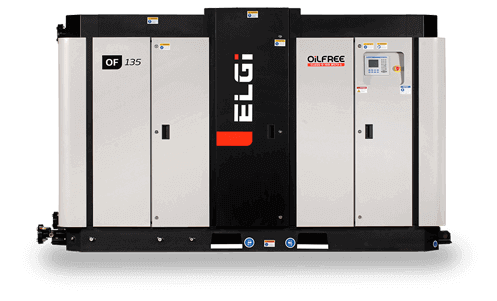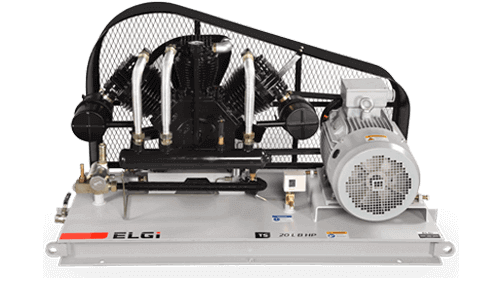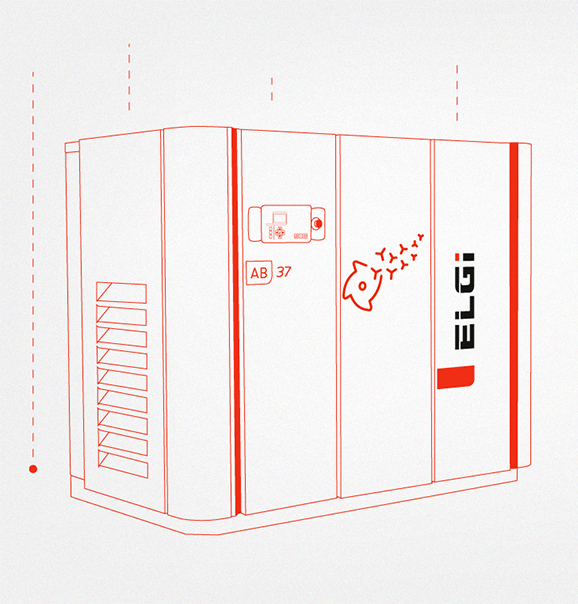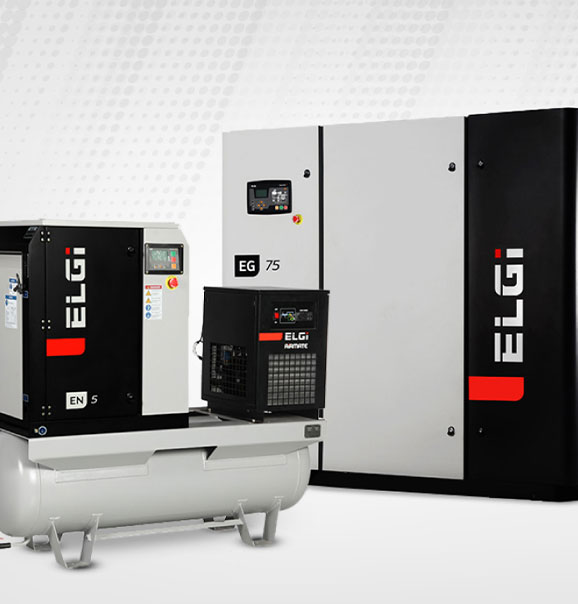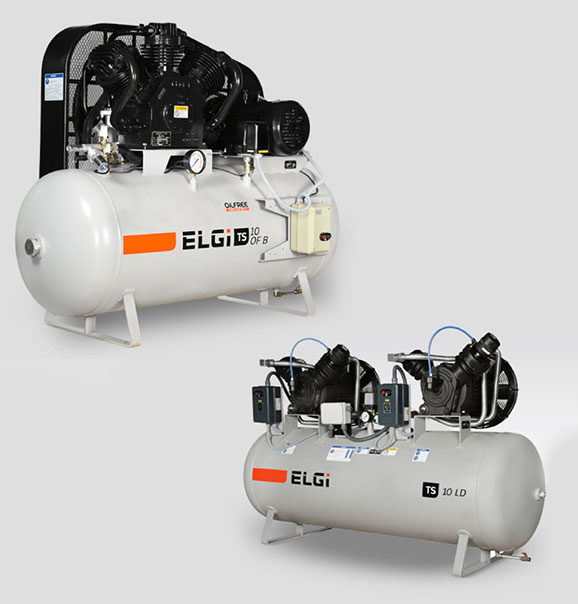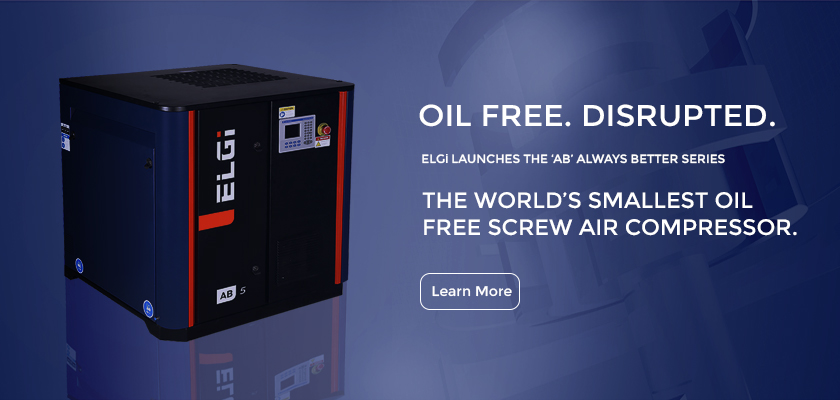Leading pharmaceutical companies from across the world rely on ELGi to deliver clean, class “0” oil-free air certified by international standards with the added benefits of high reliability, high energy efficiency, better return on investment, lower cost of ownership, and efficient aftermarket service support.
ELGi GUARANTEES THE SAFEST PNEUMATIC AIR FOR THE PHARMACEUTICAL INDUSTRY
The performance of ELGi compressors, coupled with its compelling value proposition, has resulted in reliable, high-performance, 100% contaminant-free, clean, breathable compressed air solution for the pharmaceutical sector.
ELGi delivers Class ‘0’ quality air, with the water in a closed circuit insulated with a proprietary material to ensure zero contamination. Working on a closed-loop cooling circuit means that there is no need for a water top-up, thereby ensuring ease of use in everyday operations for sensitive industries like pharmaceuticals.
STANDARDIZED COMPRESSED AIR
ELGi’s range of oil-free air compressors delivers unmatched air quality that is compliant with ISO8573-Class 7 norms, ensuring zero traces of microbial contaminants along with the IS:10500:202 certification for water quality, ensuing seamless manufacturing of medicines, capsules and other consumable products.
QUALITY BY DESIGN
ELGi's Quality by Design approach helps prevent the occurrence of quality lapses that help mitigate the high risk involved in industries that deal in drug manufacturing with dictated design measures to prevent contamination in the delivered air.
BETTER RELIABILITY WITH LOW MAINTENANCE COST
ELGi’s range of oil-free air compressors come with efficient rotors with best-in-class performance, single-stage operation and low operation speed, ensuring low maintenance cost and high energy savings with better reliability and peace of mind.
Top Tips for Optimisation of Air Compressors in the Pharmaceutical Industry
Regular Maintenance: A consistent maintenance schedule will support the performance efficiency of the air compressors. This includes checking for leaks, monitoring pressure levels, and changing filters as needed.
Proper Sizing: Ensure that your compressor is correctly sized for the specific needs of your pharmaceutical operations. Oversized compressors can lead to energy waste, while undersized air compressors in the pharmaceutical industry may not meet the factory demand.
Air Quality: Clean compressed air in the pharmaceutical industry plays a critical role in ensuring the quality and safety of products, meeting stringent industry standards for purity and sterility. Invest in appropriate filtration systems and regularly monitor air purity to prevent contamination of sensitive products.
Energy Efficiency: Include variable speed drives and optimise air pressure settings to minimise energy consumption and reduce operating costs.
APPLICATIONS OF COMPRESSED AIR IN THE PHARMACEUTICAL INDUSTRY
Compressed air is vital to the industry, and its usage can be classified into two categories: Process Air and Direct Contact.
PROCESS AIR APPLICATION
Process applications employ compressed air for a specific kinetic activity. For example, during pill production, the uncoated tablets are churned in a large drum as part of the coating process. The Compressed air often drives the drum, and it plays an important role in operating the conveyor systems.
DIRECT CONTACT APPLICATION
Direct contact entails the direct contact of compressed air with the application, thus making air quality critical. For example, compressed air is used to coat tablets to ensure their structural integrity. Impurities in this air will compromise the integrity and, worse, contaminate the product. It is also critical in jet milling, where nitrogen is used to reduce active ingredients. Specifically, the powder is fed into a milling chamber where compressed air or nitrogen, usually in a vortex motion, promotes particle-to-particle collisions. Particle classification is made by inertia, following reduction via impact and abrasion.
Compressed air is also used for bottle cleaning to safely remove dust and small particles from containers before filling. The system is particularly suitable for removing loose contaminants that may have accumulated during shipping or storage. Containers first enter the rinsing area and are then bathed with ionised air generated by special transvector air flow amplifiers. The static charge that attracts debris to the surface of the containers is neutralized. Rinsing heads use a blast of compressed air to clean them. A vacuum collects the loose particles, which are then disposed of. As a final direct application, membrane technology with nitrogen generators uses compressed air forced through a polymeric hollow fibre to selectively permeate oxygen, water vapour and other impurities out of its side walls while allowing nitrogen to flow through its centre and emerge as high-purity N2 gas.
OIL-FREE AIR COMPRESSOR IN THE PHARMACEUTICAL INDUSTRY
Amidst the companies that provide pharmaceutical products & services, oil-free air compressors play a pivotal role in the manufacturing of medicine and related products. With growing FDA scrutiny, strict warnings over toxic impurities and delicate pharmaceutical manufacturing processes, the quality of compressed air meeting the highest standards, is of utmost importance. On the other hand, continuous air supply must be guaranteed since a disruption can lead to an immense loss of production and a negative impact on the manufacturer’s reputation due to product contamination.
Africa’s thriving pharmaceutical industry needs compressed air that is free of entrained oil and other contaminants. Clean air is essential for manufacturing processes such as tablet coating & drying, bottle cleaning, nitrogen separation and much more. To achieve high air purity levels, compressors must offer specialist air treatments and must adhere to industry regulations to ensure debris, particulates and oils are removed, and that is why they need an oilless compressed air system. The amount of allowable oil in compressed air depends on its application. In line with the ISO8573-Class 7 compliance norms, which classify the quality of air based on oil content as Class 0 to Class 4.
Oil-free compressors are used in diversified pharmaceutical applications, from conveying capsules and packaging to providing factories with a steady supply of clean, breathable air. Oilless compressors are essential components to pharmaceutical industry processes, particularly during manufacturing medicines, capsules and other consumable products. As these products require the highest purity, the inclusion of oil-free air compressors ensures production remains free from contamination within automated production lines, hence lowering rejection rates for packaging applications.
FREQUENTLY ASKED QUESTIONS
TO THIS INDUSTRY
From service plans, service networks to Genuine ELGi parts, explore our vast range of services and parts to find exactly what you need.
PLACE A REQUEST


